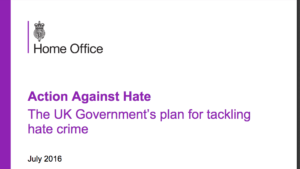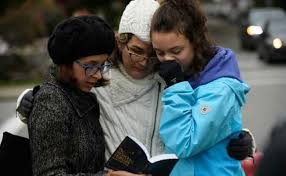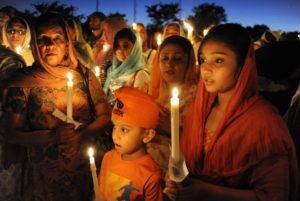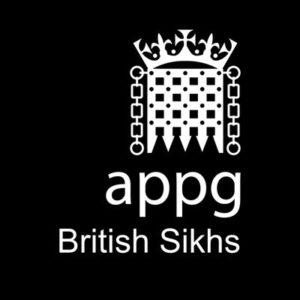 Earlier this week Lord Singh contributed to a debate following a motion tabled by minister Lord Bourne, ‘That this House takes note of the challenges posed by religious intolerance and prejudice in the United Kingdom.’ The debate coincided with the launch of the government’s ‘refresh’ of Action Against Hate (2016) their four-year hate crime plan.
Earlier this week Lord Singh contributed to a debate following a motion tabled by minister Lord Bourne, ‘That this House takes note of the challenges posed by religious intolerance and prejudice in the United Kingdom.’ The debate coincided with the launch of the government’s ‘refresh’ of Action Against Hate (2016) their four-year hate crime plan.
The NSO has historically pushed back against government policy in this area, primarily because we believe the focus on religious groups is far too narrow, and all faiths should be treated with parity when it comes to tackling prejudice. In response to the government’s announcement of a ‘refresh’ to Action Against Hate (2016), Lord Singh expressed his disappointment at the continued marginalisation of non-Abrahamic faiths, including Sikhs. He highlighted the continued backlash Sikhs have faced since 9/11 with personal anecdotes, whilst referring to the government’s inordinate focus on Jews and Muslims said, ‘Why the disparity? To echo Shakespeare: if we are cut, do we not bleed?’
During the debate Lord Morrow (DUP) independently referred to Hardeep Singh’s efforts (our Deputy-Director) in unearthing FOI data from the MET police (2015/16) which showed significant numbers of non-Muslims and those of no recorded faith, are recorded as being victim of ‘Islamophobic hate crime’.
In response to Lord Singh’s speech Lord Cormack (CON) said: ‘Lord Singh of Wimbledon, has given us several thoughts for the day in that rather splendid speech, the subtext of which was that hostility is bred from and fed by ignorance.’
Winding up the debate for Labour peers, Lord Griffiths referring to Lord Singh’s speech saying, ‘I take the point of the noble Lord, Lord Singh, that we must be careful to be more inclusive when we mention those who are on the receiving end of prejudice and discrimination—represent a broad canvas.’
He went on to congratulate the NSO’s Director on his criticism of superficial interfaith dialogue, and said: ‘Indeed, I think it was the noble Lord, Lord Singh, who came nearest to where all my thoughts were as I prepared for this debate. It is true that those conferences and symposia, those seminars that you go to, full of blandishments and fine words unrelated to causes, are about ephemeral and marginal issues. I am so pleased to hear that said. I would not have had the courage to say it, but I am delighted to have the courage to echo it. We must find a way to get to the core of the things we need to discuss together, the things beneath all the things that happen on the surface.’
We reproduce Lord Singh’s speech in full below:
‘My Lords, I want to thank the noble Lord, Lord Bourne, for initiating this important debate. I shall take my cue from the noble Lord, Lord Patten, and be a little controversial.
I read the Government’s half-time review of their hate crime strategy and find it disappointing in that it completely fails to address the underlying causes of hate crime—for much of this evening, we have done the same—and, while repeatedly addressing the concerns of the Abrahamic faiths, virtually ignores the equally real suffering of other faiths. The review details some 20 initiatives to protect against anti-Semitic and Islamophobic hate crimes. A condescending reference to occasional round-table meetings with other faiths is no substitute for action. Why the disparity? To echo Shakespeare: if we are cut, do we not bleed?
There are no comparative statistics on hate crimes suffered by different religions to justify partiality. Figures presented to justify additional resources for the Jewish and Islamic faiths come from those communities. Chief Superintendent Dave Stringer of the Met has made it clear that a significant proportion of hate crime recorded as Islamophobic is against other communities. The noble Lord, Lord Morrow, referred to a freedom of information request made by my colleague, Hardeep Singh, which showed that there is no clear definition of whom hate crime is committed against.
Many of the hate crimes described as Islamophobic are directed against Sikhs out of ignorance or mistaken identity. In the States, a Sikh was the first person murdered in reprisal after 9/11, and six worshippers in a gurdwara there were shot by a white supremacist in another mistaken-identity killing.
The day after 9/11, I was going to a meeting with the then CRE at Victoria. As I came out of the station, two workmen digging the road looked at me in a hostile way. Fortunately, their lack of religious literacy saved the day. The elder turned to the younger and said: “He’s not a Muslim; he’s a Hindu.” I did not argue the point.
Few Sikhs have not been called “bin Laden” at some time or other, and some have been violently attacked. We heard about the gurdwara in Leeds being defaced and partly burned and, only a couple of months ago, a gurdwara in Edinburgh that I had recently visited was firebombed.
I do not in any way begrudge the protection that Jews and Muslims receive against hate crime. The Jewish community has suffered grievously from anti-Semitism, and Muslims are suffering hate crime today. I have always had a warm working relationship with both communities. All I ask is that the Government are a little more even-handed to non-Abrahamic faiths in both policies and resourcing.
Let me now turn to the important causes of hate crime. Prejudice, in the sense of fear of—or irrational, negative attitudes to—those not like us, is not something found only in others; it is common to all of us. The existence of heathens in distant lands gave us a perverse sense of unity and superiority based on a shared, irrational dislike of those not like us. We find this again and again in literature. John of Gaunt’s speech in “Richard II”, with its reference to,
“This precious stone set in the silver sea”
Against the envy of lesser breeds’,
simply an example of how we viewed foreigners. Some on the leave side of the Brexit debate will probably say Shakespeare did not go far enough!
Today, the one-time distant foreigner, with a different culture and religion, can be our next-door neighbour, and it is imperative that we set aside our own prejudices and see people as they really are, equal members of one human family.
It is equally important that we look openly and honestly at prejudice embedded in religion. What generally passes for religion is, in fact, a complex mix of superstition, rituals, culture, group history and uplifting ethical teachings. While ethical teachings are easy to state, they are extremely difficult to live by, so we tend to focus on other things. Often we have a perverse, unifying but naive, belief—we find it again and again in different religions—that the creator of all that exists has favourites and takes sides, regardless of merit. As Guru Nanak reminded us:
“The one God of us all is not the least bit interested in our different religious labels but in what we do to serve our fellow beings.”
This bigotry of belief is widespread and is often found in religious texts. As a Sikh, I feel that the ultimate blasphemy is to say that texts condoning the killing or ill-treatment of the innocent are the word of God. Such beliefs lead to horrendous crimes and savagery—not only between faiths, but even within the same faith—and to increasingly familiar terrorist outrages in the name of religion. It is important to understand that religious extremists and far-right extremists need each other to thrive.
Today, despite all the lip service paid to interfaith understanding, there is virtually no dialogue between faiths to explore and understand their different religious teachings, with each remaining smug in its beliefs. I have been a member of the government-funded Inter Faith Network of the UK since it was founded in 1987 and am a member of other bodies committed to religious dialogue. Meetings rarely go beyond pious statements and academic discussions on safe peripheral concerns, with members going back to their congregations to stress the exclusivity and superiority of their teachings. Looking at an internet learning site about Islam, I was startled to see a colleague saying that he felt sorry for people of other faiths because they were “all going to hell”. I once attended a meeting of the Three Faiths Forum where Christians, Jews and Muslims were talking in a superior way about the three monotheistic faiths. According to the opening line of the Sikh scriptures, there is one God of all humanity. We need to learn a little more about each other to combat religious prejudice.
It is not all up to the Government. People of religion have a common responsibility to look afresh at negative cultural practices such as discrimination against women and others that attach themselves to religion. Religion will become more relevant if we separate dated culture from abiding ethical teachings. Secular society, which sometimes shows an aloof superiority to warring religions, should also encourage more open dialogue.
With the best of intentions, we skirt around questionable beliefs and practices by using coded camouflage words to address symptoms, rather than looking to the underlying causes of violence and hatred. Words such as “Islamist”—insulting to Muslims—“radicalised”, “extremist” or “fundamentalist” are loaded euphemisms or vague innuendos, devoid of real meaning. The absurdity of such language is illustrated by the true story of a visit to my home by two Scotland Yard officers following my criticism of the Indian Government’s involvement in mob violence against Sikhs. The men from the Yard asked if I was an extremist or a moderate. I replied that I was extremely moderate. They then asked if I was a fundamentalist. I replied, “Well, I believe in the fundamentals of Sikh teaching, such as the equality of all human beings, gender equality and concern for the less fortunate. Yes, I suppose I am a fundamentalist”.
If religions presume to tell us how we should live, move and have our being, they must be open to discussion and challenge. The same openness is absolutely essential in combating prejudice and working for a safer and more tolerant world.’
 We would like to pass on our deepest condolences to Jewish communities around the world for the terrorist outrage in Pittsburgh, which resulted in the killing of 11 innocent worshippers at the Tree of Life synagogue on Saturday.
We would like to pass on our deepest condolences to Jewish communities around the world for the terrorist outrage in Pittsburgh, which resulted in the killing of 11 innocent worshippers at the Tree of Life synagogue on Saturday.


 Earlier this week Lord Singh contributed to a debate following a motion tabled by minister Lord Bourne, ‘That this House takes note of the challenges posed by religious intolerance and prejudice in the United Kingdom.’ The debate coincided with the launch of the government’s ‘refresh’ of Action Against Hate (2016) their four-year hate crime plan.
Earlier this week Lord Singh contributed to a debate following a motion tabled by minister Lord Bourne, ‘That this House takes note of the challenges posed by religious intolerance and prejudice in the United Kingdom.’ The debate coincided with the launch of the government’s ‘refresh’ of Action Against Hate (2016) their four-year hate crime plan.